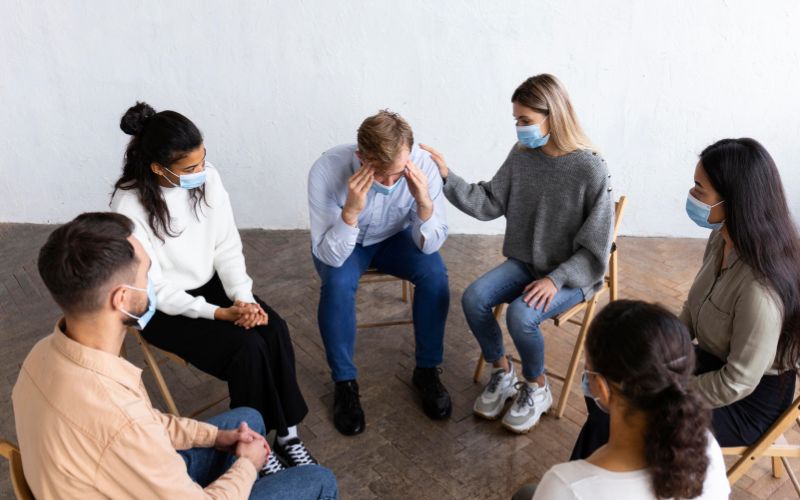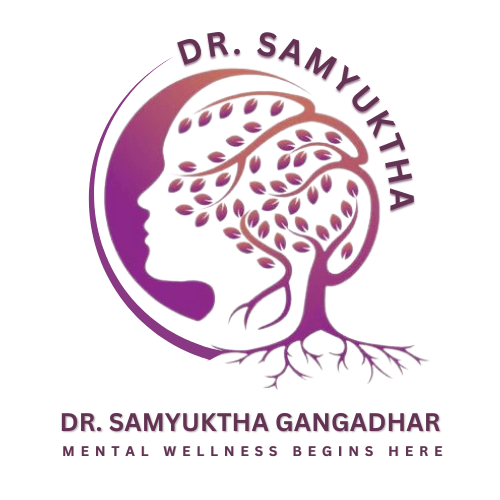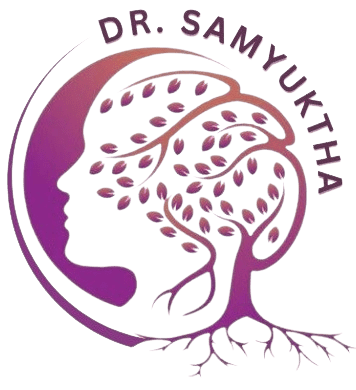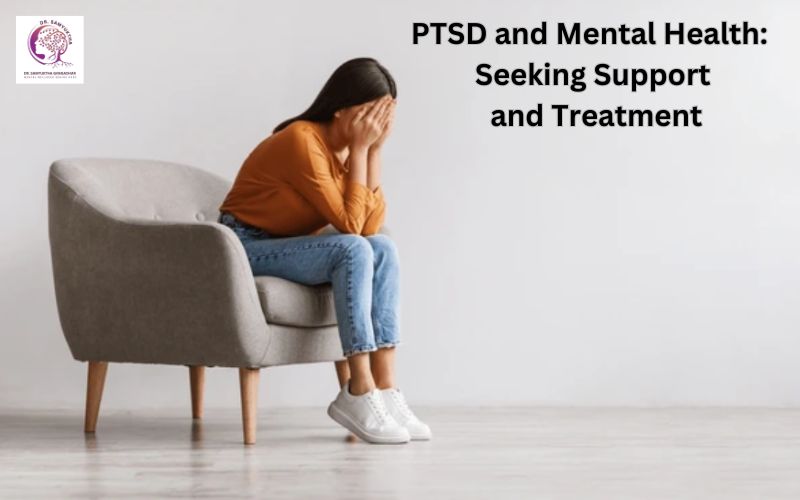Introduction
Post-Traumatic Stress Disorder (PTSD) is a mental health condition affecting millions globally, yet many struggle to understand its impact and how to seek help. At Pushpa Mind Care, led by Dr. Samyuktha Gangadhar, M.D. (Psychiatry), we focus on providing comprehensive post-traumatic stress disorder treatment in Kolkata and Bangalore. This blog highlights the importance of recognizing PTSD, the available treatment options, and how professional care can guide individuals on their path to recovery. Our goal is to offer effective strategies and support systems tailored to each patient’s unique needs.
Understanding Post-Traumatic Stress Disorder
What is PTSD?
Post-Traumatic Stress Disorder (PTSD) is a psychiatric disorder that can occur in individuals who have experienced or witnessed a traumatic event. These events can range from natural disasters, serious accidents, terrorist acts, war/combat, rape, or other violent personal assaults. PTSD is characterized by intense, disturbing thoughts and feelings related to the traumatic experience that last long after the traumatic event has ended. Individuals with PTSD might re-experience the traumatic event through flashbacks or nightmares, feel intense sadness, fear, or anger, and may become emotionally detached or isolated from others.
Symptoms of PTSD
PTSD symptoms are typically categorized into four groups: intrusive memories, avoidance behaviors, negative shifts in thinking and mood, and alterations in physical and emotional responses.
- Intrusive Memories: Persistent, involuntary memories of the traumatic event that cause significant distress.Flashbacks, where the individual feels as though they are reliving the traumatic event, are also common.
- Avoidance: Avoiding anything that might trigger memories of the traumatic event, such as specific places, people, or activities. Some may even avoid talking or thinking about the event altogether.
- Negative Changes in Thinking and Mood: This can include negative thoughts about oneself or others, feelings of hopelessness, memory problems, difficulty maintaining close relationships, and a lack of interest in activities once enjoyed.
- Changes in Physical and Emotional Reactions: This includes being easily startled, always being on guard for danger, self-destructive behavior, trouble sleeping, and irritability or aggressive outbursts.
The Impact of PTSD on Mental Health

The effects of PTSD can be pervasive, impacting every aspect of an individual’s life. It can lead to significant distress and impairment in social, occupational, and other important areas of functioning. Moreover, PTSD often co-occurs with other mental health disorders, such as depression, anxiety, and substance abuse, further complicating the individual’s overall mental health.
Seeking Support for PTSD
Recognizing the Need for Help
One of the biggest challenges individuals with PTSD face is recognizing that they need help. PTSD can manifest in subtle ways, and many people might attribute their symptoms to other factors like stress or personal weakness. It’s crucial to understand that PTSD is a medical condition that requires professional treatment. Early intervention can significantly improve outcomes, making it easier to manage symptoms and regain control over one’s life.
The Role of Family and Friends
Support from family and friends is invaluable for individuals dealing with PTSD. Loved ones can help by offering emotional support, understanding, and encouragement to seek professional help. At Pushpa Mind Care, we also offer resources and counseling for families to better understand PTSD and learn how they can support their loved ones through their recovery journey.
Professional Help: The First Step Towards Recovery
Obtaining professional help is an essential step in managing PTSD. A mental health professional, such as Dr. Samyuktha Gangadhar at Pushpa Mind Care, can provide a diagnosis and develop a treatment plan tailored to the individual’s needs. Treatment for PTSD often involves a combination of psychotherapy, medication, and lifestyle changes.
Treatment Options for PTSD
Psychotherapy

Psychotherapy, or talk therapy, is one of the most effective treatments for PTSD. Several types of psychotherapy have been shown to be particularly effective:
- Cognitive Behavioral Therapy (CBT): CBT assists individuals in identifying and transforming negative thought patterns and behaviors. It often includes exposure therapy, where individuals gradually face and deal with their traumatic memories in a safe environment.
- Eye Movement Desensitization and Reprocessing (EMDR): EMDR is a specialized therapy that helps individuals process and integrate traumatic memories. It involves recalling the traumatic event while focusing on a moving object or light, which is thought to help the brain reprocess the trauma.
- Prolonged Exposure Therapy (PE): This is another form of CBT that helps patients gradually confront their trauma-related memories, feelings, and situations they have been avoiding.
- Group Therapy: Group therapy allows individuals with PTSD to share their experiences and coping strategies in a supportive environment. It can be especially beneficial in alleviating feelings of isolation.
Medication
Medications can also play a role in managing PTSD symptoms, particularly when combined with psychotherapy. Antidepressants, such as selective serotonin reuptake inhibitors (SSRIs), are commonly prescribed to help reduce symptoms of depression and anxiety. Other medications might be used to manage specific symptoms, such as sleep disturbances or nightmares.
Lifestyle Changes
In addition to therapy and medication, lifestyle changes can be an important part of managing PTSD. Regular physical activity, a healthy diet, adequate sleep, and mindfulness practices such as meditation or yoga can all contribute to improved mental health. At Pushpa Mind Care, we encourage a holistic approach to treatment that includes these lifestyle factors as part of the overall care plan.
Pushpa Mind Care: Your Partner in PTSD Recovery

At Pushpa Mind Care, led by Dr. Samyuktha Gangadhar, we are dedicated to providing compassionate, personalized care for individuals dealing with PTSD. Our team works collaboratively to develop tailored treatment plans that address each patient’s unique needs, supporting you throughout your recovery journey.
Early Intervention: Key to Managing PTSD
Early intervention is crucial for effective PTSD management. The sooner you seek treatment, the better the chances of reducing symptoms and preventing further complications. Don’t wait—Pushpa Mind Care offers a safe and supportive environment for your healing journey.
Holistic, Patient-Centered Care
Our philosophy centers on holistic, evidence-based mental health care. We treat the whole person, combining psychotherapy, medication, lifestyle changes, and family support to ensure comprehensive care. We also focus on educating patients, empowering them to take an active role in their recovery.
Conclusion
Post-Traumatic Stress Disorder is a challenging condition, but with the right support and treatment, it is possible to manage symptoms and lead a fulfilling life. At Pushpa Mind Care, we are dedicated to helping individuals with PTSD on their journey to recovery. With expert care from Dr. Samyuktha Gangadhar, M.D. (Psychiatry), and a comprehensive approach to treatment, you can take the first steps towards healing and reclaiming your life.
FAQs
Post-Traumatic Stress Disorder (PTSD) is a mental health condition triggered by traumatic events. Symptoms include flashbacks, nightmares, and intense emotional distress. At Pushpa Mind Care, led by Dr. Samyuktha Gangadhar, we offer specialized treatment to help individuals recover from PTSD.
- Intrusive Thoughts: Flashbacks or nightmares.
- Avoidance: Steering clear of trauma reminders.
- Negative Mood: Persistent negative emotions.
- Hyperarousal: Easily startled or irritable.
- Sleep Problems: Difficulty sleeping due to nightmares.
Pushpa Mind Care provides comprehensive care to manage these symptoms effectively.
While self-care can help with mild symptoms, professional treatment is essential for recovery. At Pushpa Mind Care, we offer personalized treatment plans under the expert care of Dr. Samyuktha Gangadhar to ensure the best outcomes.


